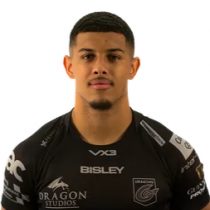Wales Team Preview: Guinness Men’s Six Nations 2024
- 6744

Inconsistency has plagued Welsh rugby in recent Guinness Men’s Six Nations campaigns, with two titles punctuated by three fifth-place finishes across the last five editions of the Championship. Two of those fifth-placed finishes have come in the last two campaigns, with Wales winning just a solitary game each time.
However, the last time Wales did that they went on to complete a Grand Slam the following year (2008) and two of their previous four Grand Slam-winning campaigns have come in post-World Cup Six Nations (2008 and 2012). That said, it would certainly be an upset if they were to accomplish that feat again in 2024.
In head coach Warren Gatland though, Wales possess a leader who has been in this situation before. Cast your mind back to 2012, and you’ll recall a young, unfancied Welsh team entering a Six Nations campaign under Gatland with limited expectations. That side went on to clinch what would be the first of back-to-back crowns.
Could history repeat itself 12 years later? Gatland’s recent comments say yes, but what do the stats indicate?
Playing Style
Wales attempt to go through their opponents rather than around them, with their 15% tackle evasion rate in the 2023 Six Nations the lowest of any nation. However, only perennial title contenders France (55%) and Ireland (52%) crossed the gainline from a greater share of their carries than Wales, showing that there’s still a place for so-called ‘Warrenball’ in the modern game.
Wales attacked the blindside more frequently than any other team in last year’s Six Nations (13%), while only Grand Slam winners Ireland attacked the middle channels more often last year; rather than spinning it out wide, Wales opted to move the ball between two and 10 metres from the previous ruck on 39% of their attacking phases.
Strengths and Weaknesses
Wales are effective when it comes to their kick-chase game, retaining possession from 14% of their open-play kicks in last year’s Six Nations, the highest rate of any team in the Championship – that rate rose even higher to 18% in the World Cup.

There were also positive signs on the defensive front in France last autumn, where Wales made the most tackles per game of any side (167) and did so with the tournament’s third-highest tackle success rate (89%). In no game was this tenacity more evident than in their opener against a Fiji side riding high following a first-ever Test victory against England. Wales completed a gargantuan 253 tackles in that match, an all-time Rugby World Cup record, on their way to a 32-26 win
For all the doggedness and passion they displayed though, Wales will need to shore up their set-pieces to stand a chance in this year’s Six Nations. The Welsh had the lowest lineout (85%) and scrum (81%) success rates of any side in the 2023 Championship and while their scrum rate improved to be the highest of any team in the World Cup (97%), their lineout retention rate remained at 85%.
Star Players
As is the case with many sides this year, Wales will be without a litany of stars due to various reasons including retirements (namely fly-half Dan Biggar), injuries, and NFL career switches. Consequentially, Gatland has been forced to name a strong contingent of youngsters in his squad and while Six Nations debuts can be daunting at the best of times, the strongest of steel is forged in the hottest of furnaces.
Dafydd Jenkins has been named as the Welsh captain for this year in Jac Morgan’s absence and is set to lead his nation out against Scotland in a typically-packed Principality Stadium at the tender age of just 21 years and 60 days. That will see him become the youngest-ever player to captain any side in a Six Nations match, taking the record from another Welshman in the form of Sam Warburton (23y 123d vs Ireland in 2012).
Jenkins is likely to be joined in the second row by Ospreys stalwart Adam Beard, the only Welsh player to feature for all 400 available minutes in last year’s Championship and whose experience could be pivotal given the large Alun Wyn Jones and Justin Tipuric-shaped holes in Wales’ pack. George North also adds an abundance of experience in the backline and could potentially overtake the legendary Brian O’Driscoll as the top try scorer in Six Nations history should he score four or more tries this year (23 currently, O’Driscoll – 26).

Louis Rees-Zammit’s 11th-hour stateside switch came as a shock to many, but it’s worth noting that he’s not the only fleet-footed winger Wales have been blessed with in recent years. Rio Dyer crossed the line in each of Wales’ last two Six Nations games in 2023 and made twice as many line breaks as any of his compatriots last year (6).


























